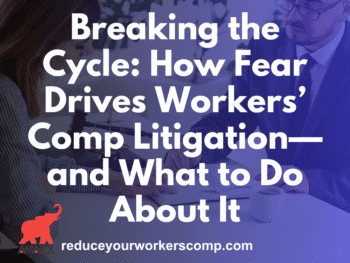Can a carrier or an employer contact a claimant who is represented by an attorney without first contacting the attorney? The Workers’ Comp Law (WCL) makes no mention of any such restrictions. In any event, it is the rule that an ATTORNEY representing a party may not contact the other party if he/she is represented by counsel.
First, a little history. When the WCL was passed in 1914 it was hardly anticipated that it would be a large adversarial system with over 50 law judges presiding over 200,000+ hearings per year. In fact, it was assumed that hearings of any kind would be rare.
The law, as originally created, had few hearings. Employers, it was imagined, would make payments directly to workers and would seek reimbursement from the carriers. When hearings were held, few attorneys attended. In fact, the carriers did not customarily attend. The referee (the original title for law judges) the employee and the employer were the only parties. Trials were rare and physicians and surgeons did not testify frequently (vocational experts, instead, often testified on levels of wage loss).
Click Link to Access Free PDF Download
“How To Avoid, Manage, And Win Workers’ Comp Claim Litigation”
Carriers soon realized that the awards they were paying might be less if they, instead of the employer, guided the claim. Even so, carriers were nearly always represented by employees who were rarely attorneys. Representation of claimants by attorneys grew gradually but was still slight until the changes of 1947, permitting lump-sum settlements for the first time.
Therefore, the WCL had little in the way of rules to deal with an influx of lawyers and still does not. Only the general rules of conduct, common to all lawyers in NY, apply.
The law anticipates that the employer, and carrier, must have an ongoing relationship with the claimant – unlike in civil suits. Both must make frequent inquiries and report to the Board. Therefore, blocking contacts with the claimant defeats most of the processes for prompt handling. It is a myth that “the Board decides”. The Board is not charged with managing claims – only resolving disputes, which are presumed to be rare, not universal.
The practice of handling claims by lengthy series of hearings is a method used to maximize attorney fees, not a method calculated to provide benefits. In any event, a LAWYER may not contact the claimant, but the employer and carrier may certainly do so.
It is a rule, however, that when papers are sent to the Board copies should also be sent to all parties. The law specifically requires copies of all appeals and subpoenas to be sent to the claimant’s attorney.
Claimant’s attorneys, however, often ignore notification requirements, frequently failing to send copies of notice of representation to carriers.
Anecdotally, a carrier’s attorney once sent the claimant’s attorney a letter forbidding the attorney to make direct contact with the carrier, insisting that all communications must be sent only to him. (He was upset that the carrier had received a letter complaining about his questionable ethics.) He sent the letter in the middle of a large, difficult trial. Soon his office began to receive a trickle, then a flood, of various documents intended for the carrier and employer. His office assumed these were addenda to some appeal and left them in a cabinet drawer until the next hearing. The carrier was then penalized for having done nothing on the claim for months, violating numerous sections of the law.
Claimants’ lawyers risk similar problems when they cut off communications with their client. If a communication is overlooked by an attorney’s office (say, for an IME exam) the claimant can lose all benefits – but gain a malpractice action with an excellent chance of success.
Communication, therefore, is the lubricant which keeps claims running smoothly. Any lawyer who sends a letter closing communication with a party should be sent a polite letter requesting the statutory authority to send such a letter. A carrier, when communicating with a claimant, should make it a practice to simultaneously copy the attorney.
Author: Attorney Theodore Ronca is a practicing lawyer from Aquebogue, NY. He is a frequent writer and speaker, and has represented employers in the areas of workers’ compensation, Social Security disability, employee disability plans and subrogation for over 30 years. Attorney Ronca can be reached at 631-722-2100.
WC Books: http://www.reduceyourworkerscomp.com/workers-comp-books-manuals.php
TD Calculator: www.ReduceYourWorkersComp.com/transitional-duty-cost-calculator.php
WC Calculator: http://www.reduceyourworkerscomp.com/calculator.php
Do not use this information without independent verification. All state laws vary. You should consult with your insurance broker about workers’ comp issues.
©2009 Amaxx Risk Solutions, Inc. All rights reserved under International Copyright Law.



























